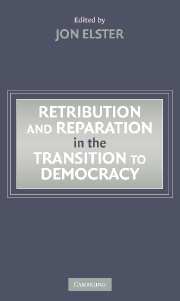Book contents
- Frontmatter
- Contents
- Contributors
- Preface and Acknowledgments
- 1 Introduction
- PART I GENERAL ISSUES
- PART II GERMANY AND GERMAN-OCCUPIED COUNTRIES AFTER 1945
- PART III LATIN AMERICA, POST COMMUNISM, AND SOUTH AFRICA
- 9 Paranoids May Be Persecuted: Post-totalitarian Transitional Justice
- 10 Transitional Justice in Argentina and Chile: A Never-Ending Story?
- 11 Transitional Justice in the German Democratic Republic and in Unified Germany
- 12 Rough Justice: Rectification in Post-authoritarian and Post-totalitarian Regimes
- 13 Truth and Reconciliation Commission in South Africa Amnesty: The Price of Peace
- 14 Conclusion
- Index
- References
9 - Paranoids May Be Persecuted: Post-totalitarian Transitional Justice
from PART III - LATIN AMERICA, POST COMMUNISM, AND SOUTH AFRICA
Published online by Cambridge University Press: 03 December 2009
- Frontmatter
- Contents
- Contributors
- Preface and Acknowledgments
- 1 Introduction
- PART I GENERAL ISSUES
- PART II GERMANY AND GERMAN-OCCUPIED COUNTRIES AFTER 1945
- PART III LATIN AMERICA, POST COMMUNISM, AND SOUTH AFRICA
- 9 Paranoids May Be Persecuted: Post-totalitarian Transitional Justice
- 10 Transitional Justice in Argentina and Chile: A Never-Ending Story?
- 11 Transitional Justice in the German Democratic Republic and in Unified Germany
- 12 Rough Justice: Rectification in Post-authoritarian and Post-totalitarian Regimes
- 13 Truth and Reconciliation Commission in South Africa Amnesty: The Price of Peace
- 14 Conclusion
- Index
- References
Summary
I distinguish three types of transitional justice (cf. a similar distinction in Huyse 1995):
Democratic restoration takes place in societies that had been democratic prior to becoming for a short period totalitarian or authoritarian, usually as a result of foreign occupation. During the nondemocratic phase, previously marginal groups become the new elite, while the old elite attempts to maintain its status, power, and property, occasionally at the cost of some collaboration. The short duration interval allows the transition back to democracy to be a restoration of old elites. Society is able to maintain its democratic traditions and easily resurrect civil society and the status quo ante by restoring or empowering old civil servants and politicians. The restoration of democracy in Western Europe after the Second World War is typical of this kind of transitional justice.
Post-authoritarian transition takes place when an authoritarian regime persists for more than half a generation, possibly in the absence of a previously well-established democracy. In authoritarian as distinct from totalitarian regimes, there is a residue of civil society that can spawn an alternative democratic elite. When the state's control of civil society, and of legal and educational institutions, is not total, there are some democratically oriented trained lawyers and judges and some other professionals and civil leaders who can operate some democratic institutions and some educators who can produce more of them.Since the transition to democracy results here usually from a negotiation process between two elites, in the presence of some kind of civil society and professional class, the final outcome depends usually on the balance of power during and after the negotiation process (cf. Nino 1996, pp. 118–27). Otherwise, all options, from Nuremberg-style trials to total clemency, are open. The transitions to democracy in Southern Europe (Spain, Portugal, Greece) and Latin America exemplify this type. South Africa combines this type with a scope of victimhood more characteristic of totalitarian regimes.
[…]
Information
- Type
- Chapter
- Information
- Retribution and Reparation in the Transition to Democracy , pp. 181 - 205Publisher: Cambridge University PressPrint publication year: 2006
References
Accessibility standard: Unknown
Why this information is here
This section outlines the accessibility features of this content - including support for screen readers, full keyboard navigation and high-contrast display options. This may not be relevant for you.Accessibility Information
- 4
- Cited by
